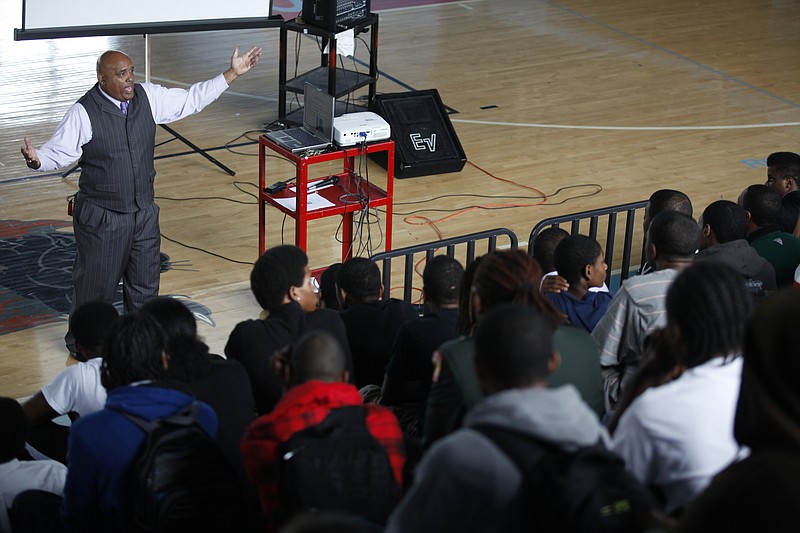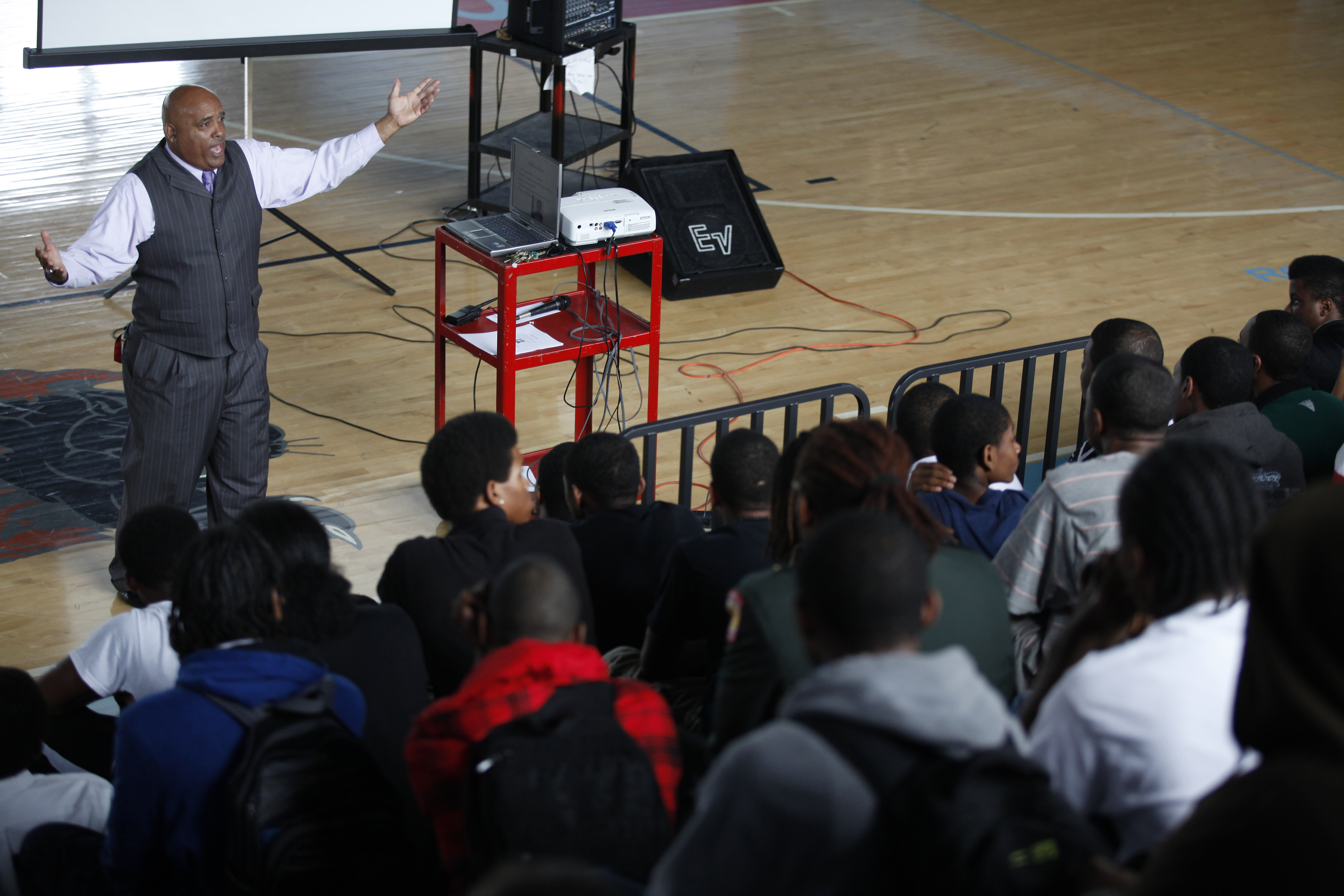BRAINERD HIGH SCHOOL AT A GLANCE• Average composite ACT score: 15.4State average composite ACT score: 19• 88 percent of students tested were not proficient in math on state math tests; the state average is 45 percent• 62 percent of students tested were not proficient on state reading tests; the state average is 31 percent• Suspensions: 262• Expulsions: 31 (64 expulsions and 317 suspensions in 2010; 43 expulsions and 233 suspensions in 2009)Source: 2011 Tennessee Report Card
The girls were called to the auditorium over the crackling public address system. Five minutes later the boys made their way to the gym.
Neither group knew what was coming, but for Brainerd High School Principal Charles Joynes this was his moment to step in and father. It was the last chance to reach these kids before prom, before all the temptations of spring break and the heat of the summer.
It was the first time he would be so candid about what he expected of his boys.
"Stand up," he told half the gym. "This is the percentage out of this whole group that typically won't graduate. ... This is the percentage going to jail."
Some of the students muttered, "Wow."
With that in mind, he said, something has to change. They have to change, and it has to start small. Take your elbows off the table. Don't spit on the sidewalk. Don't sag. Don't hit a woman even if she hits you first, even if she spits on you, he preaches.
"That is something that should have been taught to you. But if you haven't learned that, I'm telling you today," he said.
The chance for a moment of impact, a chance to set things out in black and white, has been building for some time.
There are still gang members at Brainerd - 35 percent of students, Joynes estimates. And a lot of those gang members are still trying to game the system, he said. But more than 40 of the most dangerous gang members, some of the ones who brought crack and guns to school, have been weeded out in the last two years, an effort to value order over No Child Left Behind numbers, he said.
And what's left is a more sinister threat to the school and to the students: apathy.
Some students won't try to better themselves, he said, even when they are required to put in minimal effort.
"It's not that they can't do it. There is nothing wrong with their brains. They are just saying, 'That is too much work or I don't like the subject,'" he said. "I have children that, I kid you not, if I tell them, 'Put your name on this paper, I will give you an A.' They won't put their name on the paper."
He wonders if it's because many of the students in his school don't have fathers and mothers to tell them that something is expected of them. They don't have enough people in their homes or neighborhoods telling them to pull their pants up or do their homework or pay attention in class. They don't see people coming out of their neighborhoods making it very far.
When they open the newspaper or watch television, what they see is that black people are getting shot and a lot of times black people are pulling the trigger. They know that black people were once slaves, and many of them are still in the projects and living on welfare, he said.
"They don't expect to live long," he said.
So the school's job becomes more complex then ever before. Educators know they have to get grades up, get test scores up and get more students across the finish line.
But before they can do that, Joynes said they have to start by helping redefine what it means to be a young black person.
Two high schools have come to define the experience of inner-city black youths in Chattanooga. On the south side, there is the Howard School of Academics and Technology. And on the east side, there is Brainerd High School, where teenagers from the Harriet Tubman projects, Woodlawn Apartments and some of Battery Heights go.
Brainerd, off Moore Road and miles from downtown, was once mostly white and suburban. Then in the late 1960s, between white flight and busing, the school started to look different. The faces of the principals started to look different, too. Now it has many of the hallmarks of an inner-city school like Howard, mostly black, mostly poor, many students without two parents at home.
A decade ago the feel of the school changed even more. As Chattanooga gangs continued to infiltrate, they spilled into the schools. When rezoning was approved several years ago, rival gangs from the city's east and south sides were walking the same hallways at Brainerd.
Instead of being a reprieve from the streets, Joynes said the school became a nest of drug deals, gang recruitment and, at times, violence.
Gang members decided who walked on the sidewalks and who stood aside in the grass, Joynes said.
"They were here, and they were hard and heavy," he said.
By the time Joynes came to Brainerd three years ago, it was one of the most troubled high schools in the county, although it didn't receive the same attention as Howard, a traditionally all-black high school with fierce alumni backing.
Brainerd's graduation rate has dropped from the high 60s a decade ago to 55 percent last year.
This year, although the test scores and graduation rates may not show it, Brainerd hopes to see signs of a rebirth.
Pregnant girls with large bellies and small bodies walk among the crowds at the 10:30 a.m. lunch on Wednesday. Out of more than 600 students, there are always about a dozen or so girls pregnant or with newborns, teachers say. More young men than that are fathers.
"Put shoes on," said Maria Anderson, an assistant principal at Brainerd, to one pregnant student wearing open-toed shoes in the hallway.
"My feet be swollen," she said, a little whine in her voice. Anderson lets her pass.
"They grow up quick. They grow up quick," said David Rogers, another assistant principal, who watches the kids shuffle out of the cafeteria.
The school resource officers, wearing a thick belt of guns, handcuffs and Tasers, laugh with students in the hallway. Deputy Marty Ray teased one student about when he plans to turn himself in on drug charges.
After the bell rings, other teachers hurried stragglers into class.
"I need you to get in class," one teacher yelled.
"Where are you going?" another teacher asked another student.
"I'm going to class," the students responded.
Still, some snuck off unseen, finding places to sleep or listen to music on their cell phones or hang with friends.
"They are all babies," said Anderson. "Dangerous babies, but babies."
Discipline is an everyday back and forth at Brainerd, but teachers and students will tell you that this year the school seems like a place primed to change.
There is word around the school that the principal is serious about cleaning things up. They can see that many of the worst gang members are gone, and some students say they feel safer. Tender moments around the school show that some trust has taken root between teachers and students. The kids clamor for attention.
In gym class, about 10 boys quietly play basketball, and a handful compete for the attention of their teacher, Jane Camp.
One boy stops and yells to Camp on the sideline.
"This one's for you," he hollers before taking a shot.
"Well, you better at least hit the rim!" she fires back from the sideline.
He puts up a jumper. It's short and barely brushes the right side of the orange rim.
"I hit the rim! I hit the rim!"
A student on the sideline pulls her aside to show off something on his phone. In the hallway, a boy spots Camp, runs up and gives her a hug.
"I'm older," she says. "I think they look at me like their grandmother. They are good kids."
Senior portraits and tokens of student accomplishments cover a bulletin board in Joynes' office. But one corner is pinned with the funeral programs of several students he has lost.
Joynes had mentored one of them at Brainerd. He was a gang member who was on track to graduate. Joynes said he was one of the few he confronted and actually reached. He remembers the teen bragging about his improving grades not long before he was shot in the head and back.
He wants to reach teens sooner, before they build the relationships that could kill them. He wants to tell them to stop having sex if they don't want to be parents. And if they father a child, he wants them to own up to it. He wants to tell them that gangs will use them up and spit them out. He wants to tell them that if they look like thugs people will be afraid of them.
Above all, he wants to tell them that being black doesn't mean what they think it means. And dressing professionally, cleaning up their speech and focusing on school doesn't mean they are "acting white."
"What should have happened when you were little: your daddy, your momma, your granny should have yanked your pants up for you," he told the group of boys on Friday. "Cussing and sagging is not normal to the rest of the world. It might be in your small community."
Earlier this school year, Joynes gave copies of a book called "Brother to Brother," a collection of stories about black men who turned their lives around, to all the boys at the school to discuss in class. Girls got a similar book, called "Sister to Sister," written by successful black women.
"We badly need a new definition of what is it is to be authentically black - a definition that isn't based on negative, self-destructive beliefs," one author in the book wrote.
The talk Friday was intended to start that conversation at Brainerd. Joynes said children, some of them as young as the elementary grades, are learning from other children how to steal, use guns and sell drugs.
Their days in high school are some of their last chances to hear about a different path.
After Trayvon Martin, an unarmed black teen, was shot in Florida last month by a Hispanic neighborhood watchman, the conversation has taken on a new level of importance.
"The reason why some people in our community think young black men are thugs is because so many young men with those similar characteristics are the ones doing the crimes," he said. "I just want them to really understand that there are some things that are happening in our culture that start from sight."
The lack of parenting for Brainerd students has forced the school, and others like it, to focus as much on behavior as on math, science and reading.
Deputy Ray said when he calls mothers or fathers about something their child did at school, some will promise to deal with their children, but others choose to blame the school. They believe teachers and administrators are ganging up on their kid.
So the school resource officers work on public relations, straddling the fine line between friend and enforcer. Last year, the two SROs made 50 arrests at Brainerd, Hamilton County sheriff's records show.
"We play good cop, bad cop," said Ray.
Officer Jonathan Parker, who is thin and white, uses the lingo of the Brainerd teens. He has been known to give out Dum Dums and other candy that he pays for himself. It goes quickly, but it seems to ingratiate him to the teens.
"Can you start getting us bottled water?" one girl asked.
He showed her his empty wallet.
"Oh, you got jokes," she said.
Joynes estimates only 5 percent of parents are involved on a daily basis. Of about 600 students, only about 35 parents have attended meetings.
On Wednesday one student who didn't make it to school for breakfast asked Anderson if he could buy something out of the vending machines because he was so hungry. But the machines were turned off.
"Doesn't your momma make you breakfast?" she asked.
"No," he said. "I have to buy it myself."
But the lack of involvement isn't always because parents don't care, said Joynes. Some parents are working two or three jobs. They come home late and leave early. Grandparents become involved and take over.
Regardless of what's happening in the home, the school has to pick up where parents leave off.
Teachers and administrators have to be a part of constantly setting high expectations, said Alethea Frazier Raynor, researcher at the Annenberg Institute for School Reform at Brown University.
Raynor said students also have to see the right dress and etiquette and behavior modeled at school.
"[Teachers] have to expect homework is done every night. They have to expect students to dress in a certain way. They have to expect good results on state exams," she said.
"Those ideas must also be reinforced by the community at large," she said.
Joynes agrees. Black students often connect themselves to story lines of struggle and poverty and expect the worst for their lives.
But there have been queens and kings, philosophers and scientists all throughout African history. And those stories should be the standard for what it means to be African-American, not what teens see today, he said.
"What happened from that time to now? ... People don't even want to attempt to do a piece of work. There is a disconnect," he said. "Our kids think they came from Africa and that they were slaves and that they came from slaves so they weren't nothing and they are never going to be nothing, and that's the way it is.
"But who was there before the slaves? They don't know that history."
He told them Friday that knowing these positive histories can help reform their identities as African-Americans.
"Some of that blood from them, believe it or not, runs through you," he said.
He knows a lot of teens won't understand what happened Friday. Some won't believe the message or even want to hear it. But he hopes the session will serve as a revival meeting. He just wants to plant the seed of hope.
"If you go to church you might grow up and do that bad stuff, but somewhere in their life it will come back around," he said. "A few will get sparked and ask for more. ... The fact is I am putting it out there. Now I need them to accept it."
When the bell rang, boys and girls merged in the halls to get on the buses. They don't seem to talk much about their separate assemblies. But that doesn't mean that a few didn't take something away.
In the girls' session, a group of teenage mothers, some holding their babies, told those gathered that their lives weren't over, but they were hard. Babies were more expensive than condoms, and freedom was a tough thing to lose.
"My baby daddy and I have had so many disagreements," said Symphony Jones, a senior at Brainerd.
"I miss going places, being by myself," said Alexis Brooks, a senior.
"I can't go up the hill [at Windsor Terrace] to watch the fights," said Lakandra Stover, another senior.
"You still have an opportunity to be independent, to be free," said Melissa Brassel, a school counselor at Brainerd, to the girls listening who haven't had children. "You don't have to be in this position."
Afterward, Latasha Sexton, 16, said the clarion call to save their teenage years was a moment of revelation.
"It was life changing," she said on her way to the bus. "It made me not want to have a child."
Still, other students weren't as sure.
Two boys walking down the hall said they weren't that shaken by Principal Joynes' plea.
"Maybe a couple people will change. Five people, maybe 10," said Dexter Jones, 17.
"What people say in school doesn't have a big influence," said Jeremy McGhee, 16. "It's really the community that has the influence."
For Joynes, the verdict is still out. He's doing his part.
On the Monday after spring break, he'll see whether the kids will do theirs.


